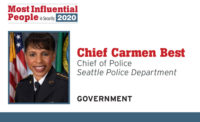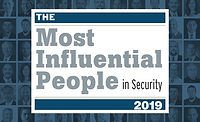Helping the security community through career changes
After attending college for business and struggling to find the right career path, Scott Ashworth joined the Forest Park Police Department in Metro Atlanta. “I asked myself, ‘What did you want to do when you were eight years old?’ And eight year old Scott wanted to be a police officer,” Ashworth says.
While the department was on the smaller side in comparison to other Metro Atlanta departments, it was a community dedicated to innovation. “We were one of the first police departments in the City Metro Area to institute a digital forensics investigation squad,” Ashworth says. As technology developed, Ashworth witnessed a shift in police investigations. A car or phone GPS, for example, could track a suspect’s movements and place them at the scene of a crime.
After a few years, Ashworth went on to work in investigations, rising through the ranks to become a Sergeant and then Lieutenant.
“Some people like listening to true crime podcasts. Well, I actually was obsessed with true crime because I was spending my free time working on my cases,” Ashworth says. Even after moving into the private sector as Head of Safety and Security at Overtime Elite, Ashworth is still involved in law enforcement as a Reserve Sheriff’s Deputy.
Ashworth notes that the transition from law enforcement to enterprise security was a difficult one, saying that “the way you get things done and the way you explain things to people is very different. A police officer going to a police lieutenant or the chief and saying, ‘Hey, we have this, this and this, I need this to combat that.’ You can't go to a CEO of a company and explain a threat using police jargon and logic to convince him to do an initiative, because you're talking to them about threats that they don't see in a way they don’t understand.”
The threats Ashworth was trained to watch for as a police officer were not the threats commonly seen in the sports and entertainment industry, and the language used to communicate them was completely different.
“Even when they get out of our stadium, because they’re all wearing that crest on their chest and they're following our players, it’s still very much our responsibility to protect those fans and players.”
— Scott Ashworth
As Director of Security, Ashworth helped build Atlanta United’s security program from the ground up. The soccer team was in its first year of existence, meaning everything had to be built from scratch. The team broke records, bringing in thousands of fans and media attention.
“The moment they started winning games, they qualified for tournaments around the world. In the offseason we were traveling, we were moving the soccer team from Honduras to Mexico and Costa Rica, in addition to anywhere domestically. We had to have a really robust security plan to protect the team not only domestically, but internationally,” Ashworth says.
An unexpected layer of Ashworth’s role in sports security was protecting the players from common hazards.
“For example, when you ask a person on the street what a sports team’s most valuable asset is, most people would probably say the stadium. But it’s their players. You want to make sure that they are walking through areas that do not have trip hazards. If they are walking behind the scenes of stadiums, you do not want somebody with a bread cart running up to their heel. So we get into the weeds of sports security, and we’re protecting these players.”
The media attention that comes with professional athletes raised additional concerns surrounding fan behavior. Ashworth’s plans had to include emergency plans for not only the stadium, but also any official Atlanta United event.
“Even when people leave our stadium, because they’re all wearing that crest on their chest and they’re following our players, it's still very much our responsibility to protect those fans and players,” Ashworth says.
Currently, Ashworth is Head of Safety and Security at Overtime Elite, an organization focused on building young basketball players’ skills and experience. What started as a solitary position quickly grew as Ashworth built a team of both security professionals and contractors at the sports media company.
“Our job is to protect the fans, the staff, the players and anybody else in the brand. Our goal is to protect all of those entities. We do that through securing our sporting events through weapons detection systems, CCTV camera systems, access control, credentialing and safety measures that include police, fire and medical services,” Ashworth says.
In addition to his work at Overtime Elite, Ashworth curates a security blog called The Sentry Post, which focuses on education and easing the transition from public to private sector for other police officers. Ashworth’s goal is to help security leaders have an easier transition than he did.
“I knew a lot of police officers will come to the corporate security environment and they will think they know more than they do. It’s not a knock on them. It’s just that there’s this world that thinks that when police officers move over to private security, they are going to understand it. That is not the truth. The Sentry Post is meant to kind of be that warning, that teacher that I didn’t necessarily have,” Ashworth says. “Being able to help even one person, even though it was a lot of work — and it still is a lot of work — it’s totally worth it. I just want to be a positive force in the world.”




